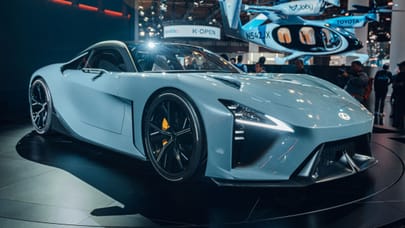
TG’s guide to concepts: the future-predicting Mercedes F700
S-Class Mercs point the way for all car tech. This concept previewed the S-Class itself


Concept cars have several main purposes, besides keeping the world's chrome and fibreglass makers in rude health. Let's see. They show off future styling and design themes (without the pesky constraints of making it actually street-legal). They drum up publicity for a faster, sexier and thoroughly impractical model (that’ll probably never see the light of day). And more often that not, in the digital, internet age, they provide a crystal ball for car technology. It’s a gadget free-for-all.
Advertisement - Page continues below
No car, except possibly Tesla (but that’s an argument for another time) exemplifies the techno arms racer as much as the Mercedes S-Class. Monocoque chassis, crumple zones, driver airbag, ESP, voice-activation, radar cruise and blind-spot monitoring – the S-Class was a pioneer for the lot. And it’s quite nice to lounge around in too.

Even family hatches have that tech these days. The S-Class just gets there half a decade early. And before that, comes a concept car. And the wild-looking F700 of 2009 is what happens when Mercedes imagines an S-Class of the future – and a car that can be let off the usually conservative styling leash…
Advertisement - Page continues below
The F700’s chief innovation was the DiesOtto engine, which ran on normal petrol but used variable compression (now appearing in Infinitis), auto ignition (as per a modern diesel), and twin turbos to offer a claimed 44mpg and 127g/km, while twisting out a respectable 238bhp and 295lb ft. Not bad – astounding, in fact – for a four-cylinder engine displacing just 1800cc.

In the post dieselgate, EV-favouring era of today, the DiesOtto engine as a whole will remain on the drawing board, with its best bits cherry picked for modern combustion engines. But don’t go thinking the F700 was a Benz white elephant. It had another trick up its sleeve.

A gizmo called Pre-Scan used two lasers to scan the road ahead and adjust the hydraulic suspension to absorb bumps in the road before the car clattered into them. Sound familiar? Yep, that very idea became Magic Ride Control in the current S-Class, albeit using two cameras instead of less sophisticated lasers.

The F700 also brandished rear-facing seats, a super-long wheelbase with tiny overhangs and suicide doors. None of that lot are in regular Mercedes street cars yet, but given its track record, would you bet against them next time?
Advertisement - Page continues below
Trending this week
- Car Review
BMW iX3







